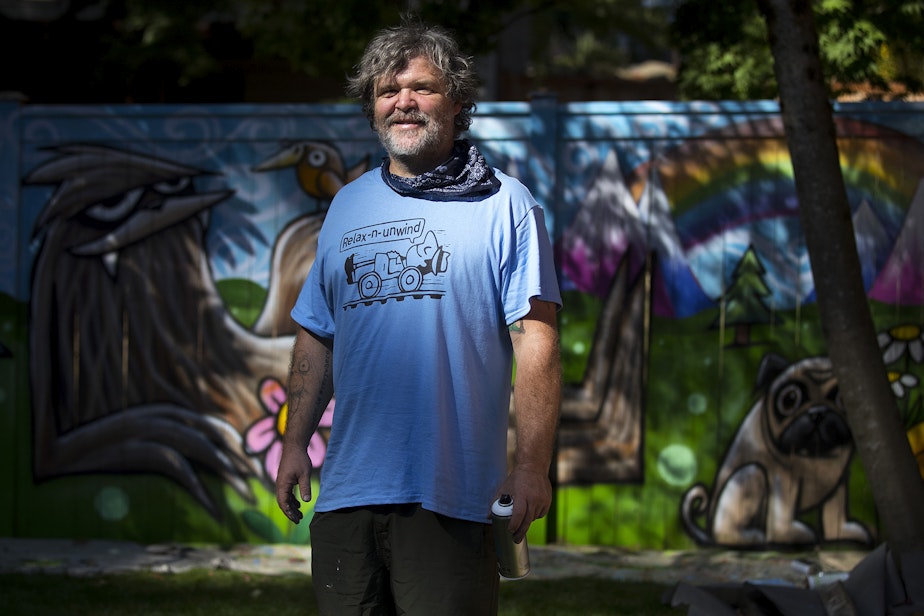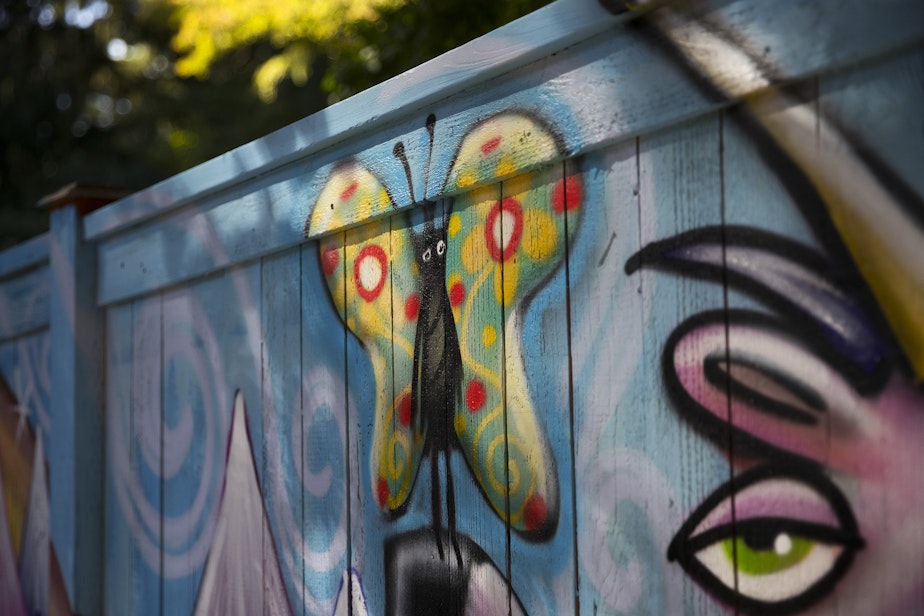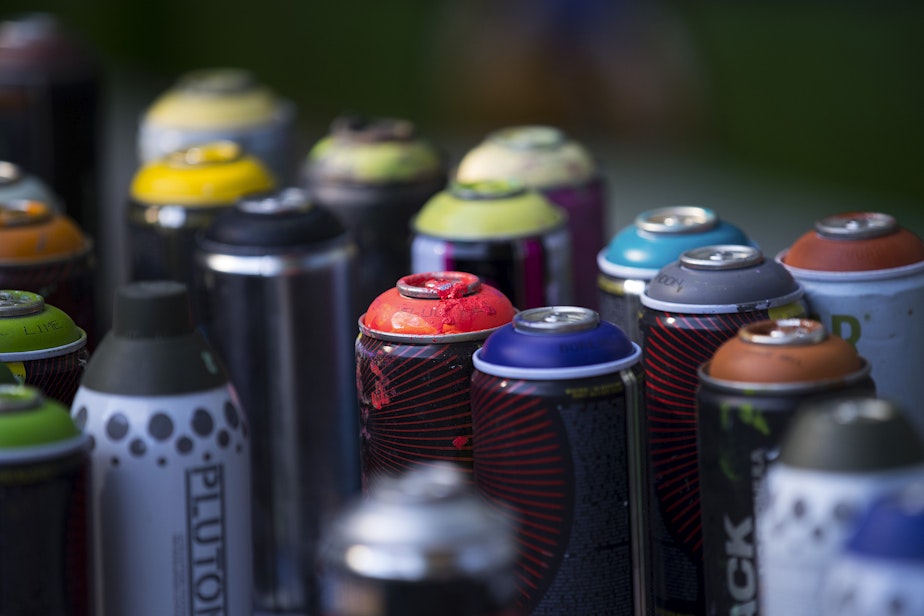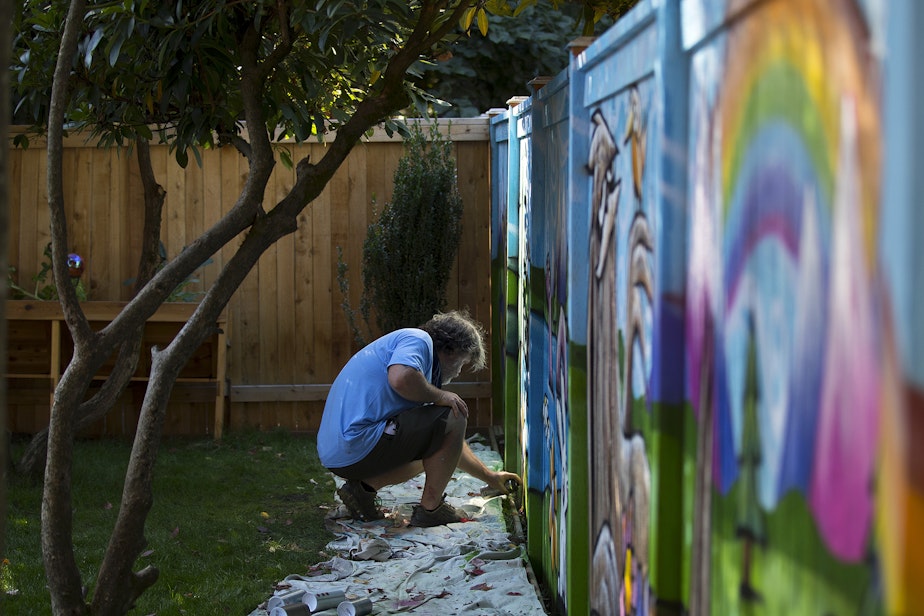Murals by henry bring joy to Seattle, but it took decades to get there

For the Seattle artist who always signs his name, ‘henry’, the joy conveyed in his art is hard won.
Ryan Henry Ward passed through multiple episodes of psychosis, homelessness, drug addiction, and relapse on his way to become the highly sought-after muralist he is now.
His murals – with their bright colors and cast of creatures – represent his reconciliation with the distinct way he experiences the world, which he tried to suppress with drugs and alcohol for most of his life.

Ward describes it as living in two realms at once. This world, right here, that you and I are inhabiting, and another one too.
Like recently, when he was spray painting a fence, a butterfly in the mural spoke to him.
Sponsored
“The butterfly just said, ‘Hey, what about me?’” Ward said. “I just heard this really soft kind of fluttery voice as I looked over.”
Ward had been spray painting the mane of a pink unicorn, and the butterfly didn’t want to be left out. So Ward painted its wings in funky disco colors.
You could call it the voice of the muse: Each character Ward paints tells him how they want to be portrayed. Ward responds, and he and the characters have a relationship.
The late Frida Kahlo, for example, had a very specific request: That Ward should paint his severed head in her hands.
“And so I did,” Ward said. “I painted my severed head in her hands, and it just flowed right out of me.”
Sponsored
These days Ward is good at managing the other realm he experiences by giving it attention and honoring it in his paintings. For a lot of his life, though, that other realm got in his way, and he tried to suppress it with drugs, Ward said.
“Like the first time I smoked weed, I felt normal,” he said. Ward finally experienced the world without the usual host of characters who usually floated around him and distracted him, he said.
“I felt more connected with people when I was stoned, and I felt like my brain wasn’t overly active.”
Over time, Ward tried a pharmacopoeia of other drugs too. But they unleashed terrible consequences.
The first big time was at age 19. He was nursing rejection from a girl he liked, and he went to a party and took a ton of the drug LSD. Ward plunged into “a psychedelic nightmare,” he said.
Sponsored
“I was running around Bellingham naked in the middle of the night,” Ward said. It was early January. “I thought I was being transformed into some kind of saint.”
The police took him to the hospital, where he stayed for six weeks. Eventually, he went home with his parents, but he was still hallucinating.
Don Ward, Ryan Henry Ward’s father, said they were "scared to death of what he was going to do to himself because he didn’t know where he was at.”
Don Ward created what he called a “grounding couch” for when his son’s hallucinations got really scary.
“I’d grab him, I sit him down on this couch and say, ‘Okay, we're on the grounding couch. There's nothing here that's going to hurt you.
Sponsored
“‘This couch’s got a big old line going right down to the middle of the earth and it's going to ground us,’” he would say. “Pretty soon he'd come back out of it.”
But half an hour later, the hallucinations might return.
Ward’s parents threw themselves into researching their son’s condition, seeking out support groups and checking out what Don Ward estimates were a hundred books.
“It was really helpful, especially when we could look at the idea that there was a possibility that he could get better, you know, gave us hope,” Don Ward said. “I think that was the biggest thing was hope.”
Finally, doctors gave Ryan Henry Ward an antipsychotic medication that, at that time in the 1990s, had recently been approved. Ward came back.
Sponsored
“I just remember going, ‘Oh my god,’” Ward said. “It was like waking up from a dream.”

Ward was diagnosed with drug-induced schizophrenia (later the diagnosis changed to bipolar disorder, Ward said). He went to rehab, twice, and stayed sober for six years.
But eventually Ward started using again, and got onto opioids, too.
When Ward was 31, he got into a four-wheeler accident. He injured his back -- badly -- and got a prescription for morphine. Ward decided to pursue an art career.
"I was able to start painting murals and do art shows,” he said.
But Ward says he felt strung out, so he stopped taking the morphine, which is when he had his second big episode of psychosis. Again it lasted for weeks and he was hospitalized.
“I thought it was the end of the world, and there was this giant war,” he said. "I thought that the Nazis had taken over the United States.”
In his mind, he was going to be tortured and he was terrified, he said.
Once again, he went on antipsychotic meds and moved in with his parents. The meds gave him back a sense of reality, but he says they sapped his creativity.
“I didn't want to paint. I didn't want to make stuff,” Ward said. “So I took myself off of those and just moved back into Seattle, and got back on the drugs that I liked.”
Drugs like opioids, and namely heroin, because it was cheap. At age 33, Ward moved into a van in Seattle and then sold that van for drug money. He was living on the streets out of a backpack. He said life was chaotic, stressful, and dangerous.
“Going into score heroin and not knowing if you're going to come out alive, you know, like on a daily basis,” Ward said. “You're sitting with your friend and you're like, ‘Okay, I'm gonna go in and get this stuff and if I'm not back in 15 minutes, call the cops.”
Around nine years ago, Ward had a turning point. He had another episode of psychosis, and his parents offered to get a second mortgage on their house to send Ward to rehab.
“I basically told him that, you know, this is the last time I'm ever doing this,” his father, Don Ward said. “I'm not going to go through this again.”
Ward was in his mid-30s and ready for a change, and he didn’t want his parents to have to pay. Instead of rehab, he agreed with his parents to move back home, stop using drugs, and attend Alcoholics Anonymous every day for a year.
Ward said he was motivated to change.
“I didn't want to get hospitalized for life," he said, "and I didn't want to go into a psychosis and never come out of it.”
Ward searched for new tools to replace the drugs.
It was rough.
He was depressed, lying on his parents’ couch for months.
Ward lacked the motivation to draw, but he knew he could write affirmations, he said.
“I would make up an affirmation, and I would write it down," he said. "I would write that one affirmation all day for like, eight hours.”
Thousands of sentences such as, “I’m grateful and capable, and glad to be alive.”
Ward didn’t believe what he was writing. Until, one day, he said, when he took a walk and found himself believing an affirmation that said, “I am the golden light of consciousness.”
For the first time, he felt good about himself, and the fact he was alive. He kept writing affirmations. He got a life coach. He got back into his art. He listened to talks on psychology, mindfulness, and happiness.
Every day, Ward makes time for exercise and sleep. He meditates and takes care of his dog. If he neglects this daily self-care routine, Ward said he can feel his brain gravitating toward a negative place, and the slope getting slippery.
Central to his recovery is one really important part: accepting himself.
“I don’t want to be different than I am,” Ward said. “I want my brain the way it is, I want this imagination that I have.”

A funny thing happened when he did embrace his imagination: It became his key to connecting with other people.
“I came across Ryan’s work and it immediately made me happy,” said Stacy Gunn, who commissioned Ward to paint a mural on her family’s water-stained back fence in Shoreline.
The world has been a sad place recently, Gunn said. “I want to bring in some of the joy, magic, beauty back in the world,” she said.
Now her backyard is filled with images of pink and purple mountains, fantastical creatures and a pug (the Gunns are a pug family).
People pay him thousands of dollars for pieces like this.
Ward’s murals are another of his tools – but for the public – to inspire our imagination and help us view the world more positively.
“We live on this planet that's just magnificent and abundant with love and support and caring for us,” Ward said.
“I want to bring more of that to people and let them know that it's okay to see the world that way.”
Through that perception, Ward says he hopes maybe we can even create a more magical world.




